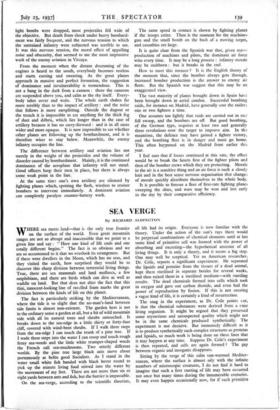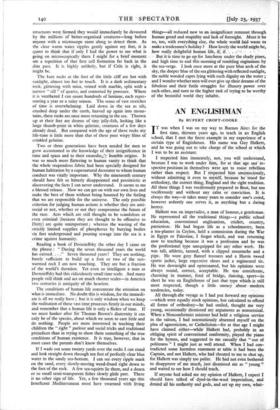SEA VERGE
By RICHARD ALDINGTON
WHERE sea meets land—that is the only true frontier on the surface of the world. Even great mountain ranges are not so abrupt and inaccessible that we point to a given line and say : " Here one kind of life ends and one totally different begins." The fact is so obvious and we are so accustomed to it that we overlook its strangeness. But if there were dwellers in the Moon, which has no seas, and they visited the earth, how surprised they would be to discover this sharp division between terrestrial living things. True, there are sea mammals and land molluscs, a few amphibians, and there are birds which can dive as well as waddle on land. But that does not alter the fact that this thin, innocent-looking line of ravAled foam marks the great division between the kinds of life on this planet.
The fact is particularly striking by the Mediterranean, where the tide is so slight that the no-man's-land between tide limits is almost non-existent. The garden here is not in the ordinary sense a garden at all, but a bit of wild mountain side with all its natural trees and shrubs untouched. It breaks down to the sea-edge in a little thirty or forty-foot cliff, covered with wind-bent shrubs. If I walk three steps from the sea-edge I can touch the trunk of a pine tree. If I wade three steps into the water I can stoop and touch rough ferny sea-weeds and the little white trumpet-shaped weeds the French call sea-mushrooms. Two utterly different worlds. By the pine tree large black ants move about portentously as befits good Socialists. As I stand in the water small white fish banded with black hover round to pick up the minute living food stirred into the water by the movement of my feet. There are not more than six or eight yards between ants and fish, but the barrier is impassable.
On the sea-verge, according to the scientific theorists, all life had its origin. Everyone is now familiar with the theory. Under the action of the sun's rays there would be perpetual combinations of chemical elements until at last some kind of primitive cell was formed with the power of absorbing and excreting—the hypothetical ancestor of all living things. It is only a theory, and it seems a big step. One may well be sceptical. Yet an American researcher, Dr. Crile, reports a significant experiment. He separated the lipoids and proteins from the tissues of a dead animal, kept them sterilised in separate bottles for several weeks, and then mixed them in a sterilised medium—with startling results. The dead chemicals formed into cells which took in oxygen and gave out carbon dioxide, and even had the power of reproduction by fission. If this is not creating a vague kind of life, it is certainly a kind of resurrection.
The snag in the experiment, as Dr. Crile points cut, is that the chemical substances were derived from a cnce living organism. It might be argued that they possessed some mysterious and unsuspected quality which might not be in the same chemicals produced synthetically. The experiment is not decisive. But immensely difficult as it is to produce synthetically such complex structures as proteins and lipoids, so much work is being done on these lines that it may happen at any time. Suppose Dr. Crile's experiment is then repeated, and cells are again formed ? The gap between organic and inorganic disappears.
Sitting by the verge of this calm sun-warmed Mediter- ranean, where the surface is almost oily with the infinite numbers of microscopic creatures, I do not find it hard to imagine that such a first starting of life may have occurred not once but many times during the innumerable centuries. It may even happen occasionally now, for if such primitive structures were formed they would immediately be devoured by the millions of better-organised creatures—long before anyone with a microscope came along to detect them. As the clear warm water ripples gently against my feet, it is queer to think that if only I had the power to see what is going on microscopically there I might for a brief moment see a repetition of that first cell formation far back in the dim past. It is highly unlikely, but if Crile is right, it Might be.
The bare rocks at the foot of the little cliff are hot with sunlight, almost too hot to touch. It is a dark sedimentary rock, glittering with mica, veined with marble, split with a narrow " sill " of quartz, and contorted by pressure. Where it is weathered I can count hundreds of laminae, each repre- senting a year or a rainy season. The sense of vast stretches of time is overwhelming. Laid down in the sea as silt, crushed deep under the earth, heaved up again into moun- tains, these rocks are once more returning to the sea. Thrown up at their feet are dozens of tiny jelly-fish, looking like a large thumb-print in white gelatine, creatures of a few days already dead. But compared with the age of these rocks my life-time is little more than that of these poor wispy films of crinkled gelatine.
Two or three generations have been needed for men to grow accustomed to the knowledge of their insignificance in time and space and to their exceedity humble origins. It was so much more flattering to human vanity to think that the whole stupendous fabric had been specially designed for human habitation by a supernatural decorator to whom human conduct was vitally important. Why the nineteenth century should have felt so bitterly disappointed and pessimistic at discovering the facts I can never understand. It seems to me a blessed release. Now we can get on with our own lives and make the best of them without being haunted by the feeling that we are responsible for the universe. The only possible criterion for judging human actions is whether they are anti- social or not, whether or not they compromise the future of the race. Acts which are still thought to be scandalous or even criminal (because they are thought to be offensive to Deity) are quite unimportant ; whereas the wasting of the strictly limited supplies of phosphorus by burying bodies six feet underground and pouring sewage into the sea is a crime against humanity.
Reading a book of Dostoieffsky the other day I came on the phrase : " During the seven thousand years the world has existed. . . ." Seven thousand years ! They are nothing, barely sufficient to build up a foot or two of the sun- warmed rock I am now touching. They are but a fraction of the world's duration. Yet even so intelligent a man as Dostoieffsky had this ridiculously small time scale. And many people still think and act on much shorter scales—in America two centuries is antiquity of the hoariest.
The conditions of human life concentrate the attention on what is immediate. No doubt this is wisdom, for the immedi- ate is all we really have ; but it is only wisdom when we keep the realisation of these vast time processes firmly in our minds, and remember that a human life is only a flicker of time. If we must hanker after Sir Thomas Brown's diuternity it can only be of the species, about which we seem to care little and do nothing. People are more interested in teaching their children the " right " parlour and social tricks and traditional prejudices than in trying to show them something of the true conditions of human existence. It is wile, however, that in most cases the parents don't know themselves.
If I wade out some twenty yards over the rocks I can stand and look straight down through ten feet of perfectly clear blue water to the sandy sea-bottom. I can see every ripple mark on the sand, every slowly-moving weed-frond right down to the foot of the rock. A few sea-squirts lie there, and a dozen or so small semi-transparent fishes slowly glide past. There is no other sign of life. Yet, a few thousand years ago this beneficent Mediterranean must have swarmed with living things—all reduced now to an insignificant remnant through human greed and stupidity and lack of foresight. Must it be so, too, with everything else, the whole world laid waste to make a tradesmen's holiday ? How lovely the world might be, how really delightful human life, if, if. . . • - But it is time to go up for luncheon under the shady pines, and high time to end this morning of rambling cogitations by the sea-verge. I look once more at the pure blue arch of the sky, the deeper blue of the sea glittering with reflected sunlight, the noble wooded capes lying with such dignity on the water ; and I wonder whether men will ever give up their dreams of the fabulous and their futile struggles for illusory power over each other, and turn- to the higher task of trying to be worthy of the beautiful world they inhabit.































































 Previous page
Previous page